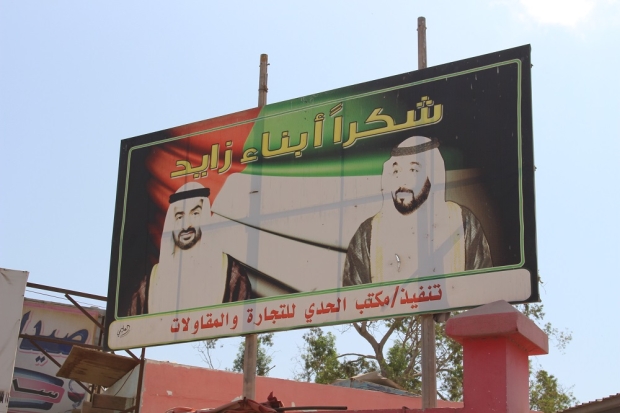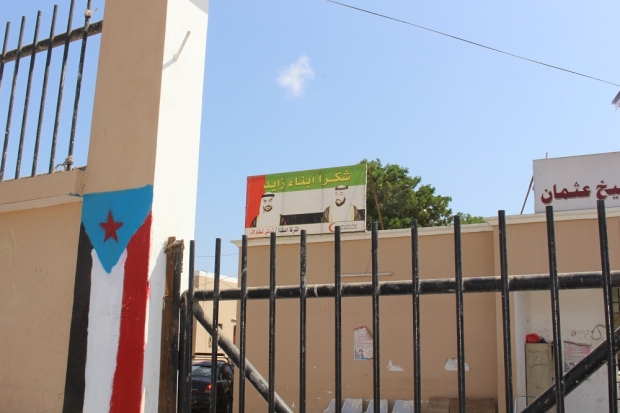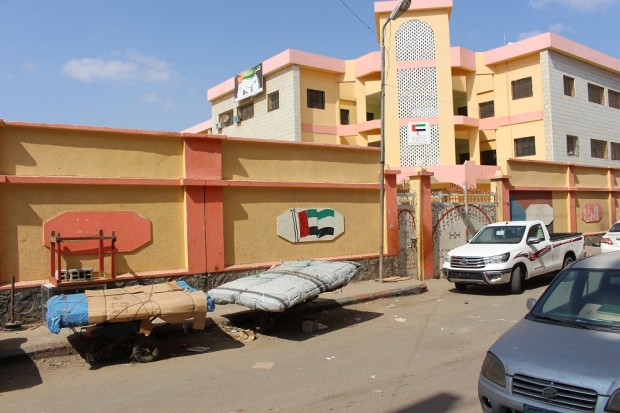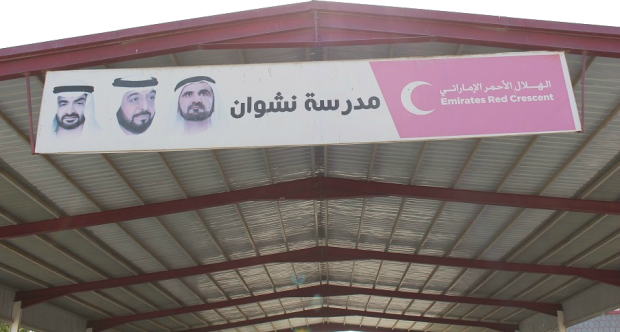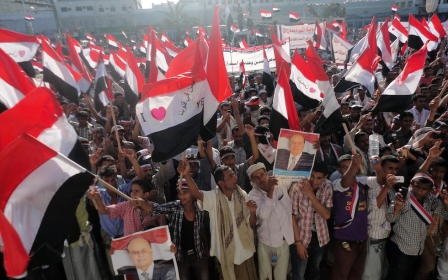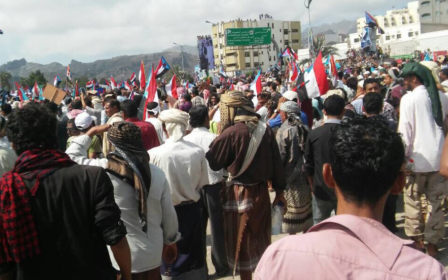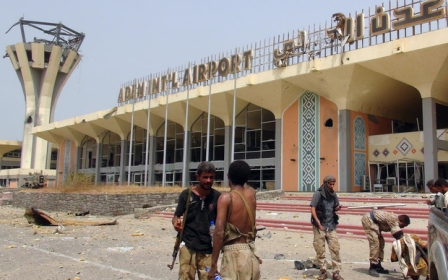UAE runs Aden as protectorate, while Hadi hides in the shadows
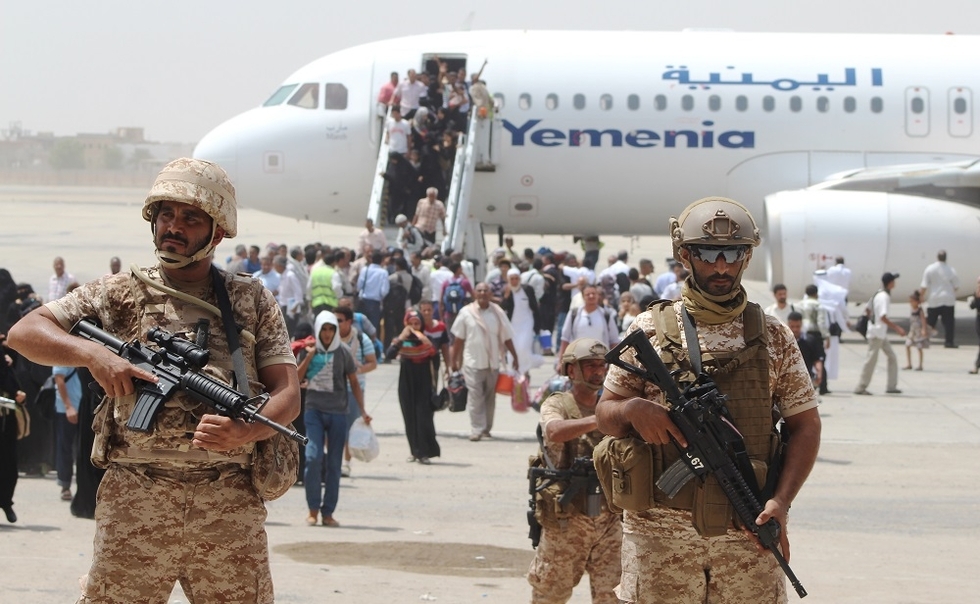
ADEN, Yemen - A tour around Yemen's second city leaves little doubt about who is in control. On street posters and placards, images of Aden's most powerful men, dressed in national costume, stare out from a backdrop of the colours of their national flag.
But the portraits are not of Yemen's president, Abd Rabbuh Hadi. The flags are not Yemeni. They are not even from Yemen. They are the leaders of the United Arab Emirates.
'Most security and military forces consider themselves fighters with the Emirates'
- Aqeel al-Yafei, Security Belt officer
The UAE controls Aden's seaport and airport, most of its military checkpoints, if not all, and formed and now commands the powerful military force known as the Security Belt. Its Red Crescent Society rebuilt the city's public institutions.
It has set up a prison system, with claims from some in Aden of arbitrary arrests designed to silence those in opposition to the UAE powergrab, and the UAE-allied Southern Transitional Council's call for independence from Yemen.
And no where is there any visible influence of Hadi, who the UAE is ostensibly defending as part of the Saudi coalition fighting the Houthis. His presidential guard and his supporters in the Islah party, outnumbered and outgunned, keep a low profile.
The posters adorning the streets of Aden are either erected by Yemenis grateful for the UAE, or by the institutions controlled by the UAE.
"Most of the security and military forces in the south work under the leadership of the UAE and consider themselves fighters with the Emirates," Yafei told Middle East Eye.
"The UAE did not invade like the Houthi and Saleh forces. They came to help us."
"When the Houthis invaded Aden, they looted the weapons from military camps, but after the liberation the UAE rebuilt and provided us with weapons and military vehicles."
"Only the presidential force is not under the leadership of Aden and their only task is to guard."
The strength of the Security Belt's forces are such that its men have shut down Islah party offices in Aden, and imprisoned many of its senior members.
Last month, the Security Belt arrested 11 Islah leaders, including under-secretary Mohammed Abdul Malik, and stormed two of the party's main bases: the first in al-Tawahi district and the second in Crater, which was also burned.
"The UAE are supervisors helping to save Aden and other southern provinces, so it supervises the military camps and prisons. The UAE has done nothing wrong."
'Creators of chaos'
MEE contacted several pro-Hadi and Islahi leaders in Aden but all declined to speak, saying they were concerned for their welfare and reprisals from the UAE's supporters.
A member of the Islah party, who did not wish to be named, said he believed the UAE was acting against the interests of Yemen in Aden, and was seeking to undermine the Hadi government to realise its own foreign policy aims.
"The UAE supports militias against the government and the president; this is enough reason to say that UAE creates chaos in Yemen."
'The UAE is the strongest in Aden, and no one can oppose it'
- Islah party member
"In 2015, the Islah welcomed the UAE within the Saudi-led coalition but it is clear the UAE has found new allies, and supervises military camps and prisons. This is the duty of the government and not the UAE."
The source said there were no Houthis in Aden, and the UAE's troops should either fight them in Taiz to the north, or leave.
"No one can criticise the UAE in Aden without fear of retaliation - the Security Belt forces have spread everywhere. They can arrest and imprison anyone."
The Islah source claimed the UAE was also siding with Salafi militias in Taiz, and undermining the "Popular Resistance" forces fighting the Houthis.
On Saturday, there were fierce clashes between Salafi fighters under the leadership of Abu al-Abbas - recently branded an al-Qaeda operative by, among others, Saudi Arabia and the UAE - and the guards of the security office backed by Islahi fighters in Taiz.
The source stated that Yemenis needed the UAE to focus on militant groups: "Islamic State fighters and al-Qaeda are still targeting Aden. But the UAE and the Security Belt are busy trying to arrest the Islahi leaders and storm our headquarters."
IS claimed a major attack on Aden early this month which killed at least 15 people and wounded 18 others.
'They beat us without reason'
Omar, 37, who moved to Aden from Taiz, was arrested in Aden's al-Sheikh Othman street with two friends in April 2015 by soldiers from the Security Belt. They were taken to Bir Ahmed prison, under the supervision of the UAE.
"The Yemeni forces beat us without reason, and were encouraged to do so by the UAE. They beat us for demanding a fair trial," Omar told MEE.
"When I asked about my accusation, they said my ID card was expired. It was a silly accusation by stupid soldiers."
"The new prisons of the UAE is a fact that no one can change, but we demand public courts to send delegations to these prisons, as all inside deserve fair trials."
He said most prisoners were simply picked up for their opposition to southern independence and the UAE.
Fadhl al-Rabie, the head of Aden's Madar Strategic Studies Centre and a member of Southern Transitional Council, dismissed complaints against the UAE, said southerners were striving for independence under its leadership, and that they did not support Hadi.
There have been some mistakes by the UAE, but it is supervising a country full of disputes
- Fadhl al-Rabie, Southern Transitional Council
"There is alliance between the southerners and the UAE, which is part of the Saudi-led coalition and it is responsible for Aden and other southern provinces," Rabie said.
"Mistakes happen, and there have been some mistakes by the UAE, but it is supervising a country full of disputes."
This article is available in French on Middle East Eye French edition.
Middle East Eye propose une couverture et une analyse indépendantes et incomparables du Moyen-Orient, de l’Afrique du Nord et d’autres régions du monde. Pour en savoir plus sur la reprise de ce contenu et les frais qui s’appliquent, veuillez remplir ce formulaire [en anglais]. Pour en savoir plus sur MEE, cliquez ici [en anglais].


